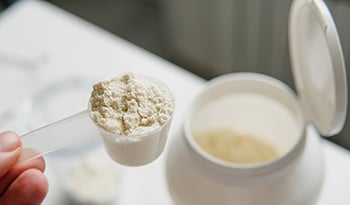Top 10 Supplements for Men

Men have unique nutritional needs that must be taken into account to optimize health. Below is a list of the top supplements men should evaluate and consider adding to their regimen. As men age, parts of the body begin to deteriorate, and these changes can create challenges in everyday life. For some, these changes can even negatively impact relationships and possibly job performance.
Ginseng
Panax ginseng is taken for a great number of medical conditions. The origins of this plant begin in Korea, and it has been used for over 2,000 years since. Also grown in areas of China and Siberia, panax ginseng is unique—it should not be mistaken with other known ginsengs, such as American or Siberian ginseng. Panax ginseng may also be identified as Korean ginseng, Chinese ginseng, or Asian ginseng.
Scientific studies have shown ginseng has the following health benefits:
- Provides immune system support
- Optimizes brain health
- Helps with weight management
- Helps improve blood sugar control
- Helps reduce symptoms of anxiety and depression
- Helps improve energy levels
- Helps prevent hardening of arteries, a process caused by calcium deposits in the arteries, according to a 2014 study.
Suggested dose: as directed on the label
L-Arginine
L-arginine is an amino acid crucial for healthy circulation of blood. A 2014 study demonstrated this amino acid to be helpful for angina, vascular disease, and erectile dysfunction. A 2017 study showed that men with erectile dysfunction had lower levels of this amino acid and L-citrulline in their blood. A 2015 study showed that L-arginine, when taken with the supplement Pycnogenol, helped improve erectile function and sperm quality. Another 2015 study in The British Medical Journal showed similar findings when the combination of Pycnogenol and L-arginine were taken.
Suggested dose: as directed on the label
L-Citrulline
L-citrulline is an amino acid, which supports healthy blood flow. A 2017 study showed that men with erectile dysfunction had lower levels of this amino acid and L-arginine in their blood.
A 2015 study showed L-citrulline, L-arginine and Pycnogenol combined supplementation could help those with erectile dysfunction.
Suggested dose: as directed on the label
Magnesium
Magnesium is an important mineral and enzyme “cofactor” involved in over 350 chemical reactions in the human body. An adequate intake of magnesium-rich foods, which include green leafy vegetables, is crucial. Frequently, diet is not enough and a supplement is required.
Certain medications increase risk of a magnesium deficiency. These medications include acid reducers (i.e. omeprazole, pantoprazole, ranitidine) and diuretic water pills (i.e. furosemide, triamterene, hydrochlorothiazide).
Common side effects of a magnesium deficiency include:
- Muscle cramps
- Eyelid twitches
- Heart palpitations
- Migraine headaches
- Tension headaches
- Anxiety symptoms
- Constipation
- Overactive bladder
Men who exercise routinely and sweat are frequently low on magnesium. Chronic stress can also lower magnesium levels. In addition to a diet rich in vegetables, a magnesium supplement should be considered. Despite advertising claims, sports drinks are usually a poor source of magnesium.
Suggested dose: Magnesium chelate (magnesium aspartate, magnesium citrate, magnesium malate) should be taken daily—125mg to 500 mg. If you develop loose stools, reduce your dose. A magnesium oxide formulation can also be considered, but it is not absorbed as well.
Multivitamin
A multivitamin should be taken by each and every man. While a well-balanced diet is crucial to optimal health, our daily stressors can put additional metabolic demands on our body that may not always be fulfilled by diet alone. Chronic disease affects our nutrient requirements while many popular prescription drugs can also deplete the body of important vitamins and minerals.
On June 19, 2002, a study in the Journal of the American Medical Association stated, “We recommend that all adults take one multivitamin daily…”
A quality multivitamin provides additional assurance that the body is getting what it needs. If extra nutrients are present, the body will store what it needs and eliminate the additional. Unless a man has been told to supplement with iron, men’s multivitamins should not include it.
Ensuring your multivitamin has iodine in it is also important as studies show that more than 10 percent of people worldwide may be deficient in this vital nutrient. A 2011 study in Thyroid demonstrated that almost 10 percent of people in the United States had moderate to severe iodine deficiency, and at least an additional five percent are mildly deficient.
Suggested dose: As directed on the label
Omega-3 Fish Oils
Omega-3 essential fatty acids consist primarily of, particularly, eicosapentaenoic acid (EPA) and docosahexaenoic acid (DHA). A 2014 study in Nutrition Journal showed that the majority of Americans do not consume enough essential fatty acids in their diet. These important nutrients can be found in a variety of food sources, which include fish (mackerel, cod, and salmon are among the richest), walnuts, chia seeds, flax seeds, hemp seeds, avocado, and natto.
A 2017 study in Future Science showed omega-3 fish oils can reduce the inflammation leading to heart disease. Another study from the same year in Atherosclerosis showed that higher levels of omega-3 in the blood could reduce death from heart disease by 30 percent.
Drug companies manufacture and sell pharmaceutical-grade fish oil, which has been shown to lower triglyceride levels by 50 percent. However, non-pharmaceutical fish oil capsules appear to provide the same benefit at a fraction of the cost.
Suggested dose: Omega-3 fish oil 1,000 to 4,000 mg daily
Saw Palmetto
As men age, many will experience symptoms related to an enlarging prostate, a condition doctors call BPH or benign prostatic hyperplasia. Symptoms include difficulty emptying the bladder, urine dribbling, reduced urine flow, and urinary frequency. There are prescription medications available to reduce symptoms, however, many prefer to try a more natural approach. Saw Palmetto (Serenoa repens) is an herbal medication that studies show may be helpful.
A 2002 study by Cochrane Database concluded that Saw Palmetto provided mild to moderate benefit in urinary symptoms and improved urine flow. Countering this, a 2009 study showed Saw Palmetto by itself was not more effective than a placebo.
However, a 2017 study that lasted 12 months did show benefits to urine flow in men who took Saw Palmetto when compared to those men who were not treated. There are also studies that show that Saw Palmetto, when taken in combination with selenium and lycopene, is more effective than Saw Palmetto alone. I have noticed that about half the patients I recommend this herb to notice benefits in prostate symptoms.
Suggested dose: as directed on the label
Vitamin C
Vitamin C, or ascorbic acid, is a crucial vitamin with antioxidant properties. A 2009 study in The American Journal of Clinical Nutrition, which solely featured people from the United States, found over seven percent of individuals age six and older were vitamin C deficient based on blood tests. More than half surveyed consumed low amounts in their diet. Vitamin C levels are lower in those who smoke since it acts as an antioxidant.
Recently, I diagnosed a 57-year-old male in my practice with scurvy. He admitted to a poor diet and had bleeding gums and easy bruising due to his low platelet count. A blood test confirmed a vitamin C deficiency, and his bleeding gums improved after a few weeks of increased vitamin C intake. Due to excessive alcohol intake, his platelets remained low.
Vitamin C also plays a significant role in collagen formation, the main component of arteries and skin. Studies show a diet high in foods containing vitamin C is good for the heart. Topical vitamin C formulations have also been shown to be helpful for facial wrinkles, which could be beneficial for men concerned about their appearance.
Suggested dose: Vitamin C capsules or vitamin C powder from 500 mg to 2,000 mg daily. Topical vitamin C, apply as directed for skin protection.
Vitamin D
Thousands of studies over the last decade show health benefits when one optimizes vitamin D intake. These studies tell us that those with higher levels of vitamin D in their blood have lower risk for heart attacks, prostate cancer, colon cancer, multiple sclerosis, and other health complications.
In my Southern California medical practice, a place where we have sunny skies more than 300 days per year, four in five of my patients have had a clinical vitamin D deficiency.
The reason for this common deficiency is that few people spend the required 15 to 20 minutes each day in the sunlight, allowing their face, arms and legs to be exposed to ultraviolet light. Up to 90 percent of people around the world are deficient. Those with more melanin, which is responsible for skin pigmentation, require up to 30 minutes in the sun per day to generate adequate vitamin D. Those over age 65 years also require more time outdoors to generate vitamin D due to reduced skin elasticity.
Lower levels of vitamin D in the blood have been associated with increased risk for the following conditions:
- Colon cancer
- Pancreatic cancer
- Multiple sclerosis
- Auto-immune conditions
- High blood pressure
- Heart attacks and strokes
Suggested dose: Adults 1,000 IU to 5,000 IU daily. Children, 1,000 IU to 2,000 IU of vitamin D. Read more about the health benefits of vitamin D. Take under the supervision of your doctor.
Whey Protein
Whey protein is a common supplement used by those who exercise routinely and is frequently used as a meal replacement by those trying to maintain or lose weight. Whey is also a popular source of protein for those trying to build muscle.
Health benefits of whey protein include:
- Excellent source of protein
- Helps with weight loss
- Muscle growth
- Lowers blood pressure
- Lowers blood sugar
- Lowers cholesterol
- Helps the liver remove toxins
- Helps reduce hunger
A 2017 study showed whey protein could help reduce injuries in marathon and amateur runners while a 2018 study in the British Journal of Sports Medicine showed whey protein supplementation helped improve muscle strength and muscle mass. Whey protein is a great addition to a fruit and vegetable smoothie.
Suggested dose: As directed on the label
Summary:
A well-rounded diet rich in fruits and vegetables and routine exercise is crucial for overall health and disease prevention. There are certain conditions unique to men which certain supplements may be helpful in improving and even preventing. If you are taking prescription medications or are under the care of a doctor for specific health conditions, consult with your physician prior to making any changes to your regimen.
References:
- Lee J, Cho J-Y, Kim W-K. Anti-inflammation effect of Exercise and Korean red ginseng in aging model rats with diet-induced atherosclerosis. Nutrition Research and Practice. 2014;8(3):284-291. doi:10.4162/nrp.2014.8.3.284.
- Acta Biomed. 2014 Dec 17;85(3):222-8.
- Andrology. 2017 Mar;5(2):256-261. doi: 10.1111/andr.12293. Epub 2017 Feb 8.
- Arch Ital Urol Androl. 2015 Sep 30;87(3):190-3. doi: 10.4081/aiua.2015.3.190.
- Andrology. 2017 Mar;5(2):256-261. doi: 10.1111/andr.12293. Epub 2017 Feb 8.
- Minerva Urol Nefrol. 2015 Mar;67(1):27-32.
- Fletcher RH, Fairfield KM. Vitamins for Chronic Disease Prevention in Adults Clinical Applications. JAMA.2002;287(23):3127–3129. doi:10.1001/jama.287.23.3127
- Thyroid. 2013 May;23(5):523-8. doi: 10.1089/thy.2013.0128. Epub 2013 Apr 18.
- Thyroid. 2011 Apr;21(4):419-27. doi: 10.1089/thy.2010.0077. (Note: Iodine deficiency in the United States is higher than 10% of the population. I suspect upwards towards 20% using the WHO urinary value of 100 mg/L or less being deficient)
- Papanikolaou Y, Brooks J, Reider C, Fulgoni VL. U.S. adults are not meeting recommended levels for fish and omega-3 fatty acid intake: results of an analysis using observational data from NHANES 2003–2008. Nutrition Journal. 2014;13:31. doi:10.1186/1475-2891-13-31.
- Bäck M. Omega-3 fatty acids in atherosclerosis and coronary artery disease. Future Science OA. 2017;3(4):FSO236. doi:10.4155/fsoa-2017-0067.
- Atherosclerosis. 2017 Jul;262:51-54. doi: 10.1016/j.atherosclerosis.2017.05.007. Epub 2017 May 6.
- Cochrane Database Syst Rev. 2002;(3):CD001423.
- Cochrane Database Syst Rev. 2009 Apr 15;(2):CD001423. doi: 10.1002/14651858.CD001423.pub2.
- Pril (Makedon Akad Nauk Umet Odd Med Nauki). 2017 Sep 1;38(2):123-129. doi: 10.1515/prilozi-2017-0030.
- Curr Med Chem. 2013;20(10):1306-12.
- Journal of Urology. 2011 Oct;186(4):1524-9. doi: 10.1016/j.juro.2011.05.049. Epub 2011 Aug 19.
- Am J Clin Nutr. 2009 Nov;90(5):1252-63. doi: 10.3945/ajcn.2008.27016. Epub 2009 Aug 12.
- Heart Advis. 2015 Oct;18(10):10.
- Al-Niaimi F, Chiang NYZ. Topical Vitamin C and the Skin: Mechanisms of Action and Clinical Applications. The Journal of Clinical and Aesthetic Dermatology. 2017;10(7):14-17.
- J Steroid Biochem Mol Biol. 2017 Apr;168:1-8. doi: 10.1016/j.jsbmb.2016.12.003. Epub 2016 Dec 16.
- J Am Coll Nutr. 2017 Oct 31:1-11. doi: 10.1080/07315724.2017.1344591. Benefits of Whey Protein [Epub ahead of print]
- Int J Med Sci. 2017 Jun 22;14(7):648-654. doi: 10.7150/ijms.19584. eCollection 2017.
- British Journal of Sports Medicine. 2018 Mar;52(6):376-384. doi: 10.1136/bjsports-2017-097608. Epub 2017 Jul 11.
DISCLAIMER:This Wellness Hub does not intend to provide diagnosis...
















































































 Table of Contents
Table of Contents













